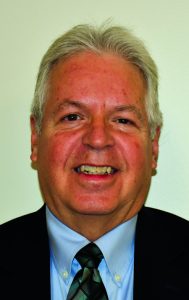By Jack Chavez, Staff Writer
After some spirited debate, the Ocean Pines Association Board of Directors unanimously passed a revised Resolution M-06 and tabled Resolution B-03 pending further research on Monday.

Ocean Pines Board Director Doug Parks
The board went through two readings of each resolution, beginning at its regular meeting on June 22. Elections Committee Chair Carol Ludwig sat in on discussions over both resolutions and was allowed to answer questions and provide her input on them.
The revised M-06 resolution will allow for electronic voting at the annual board elections and referendums, director Larry Perrone said. The purpose and effect of the changes and amendment would be to allow OPA to contract with a vendor to provide the necessary services.
The most engaged debate over M-06 involved a scenario the association hopes it never has to contend with: what happens in the event of a recount?
The debate over the recount scenario took up time during both meetings — how a recount is conducted, how to avoid double-counting votes and how to store ballots in the event of a recount.
“It’s a fair question,” Association Vice President Frank Daly said. “Why don’t we just ask the electronic voting company how they handle a recount? I know this is a deadly assumption to make but I would sure like to believe that Ocean Pines isn’t the only (entity) using electronic voting in the United States of America to have a recount.”
Joe Reynolds, who runs OceanPinesForum.com asked during the June 22 meeting whether the use of mail ballots and electronic voting might lead to duplicate votes being cast.
“If you mail a ballot to everybody and somebody — it’s going to happen — somebody is going to do both and they’re going to send a ballot back and vote electronically,” Reynolds said.
Ludwig replied that duplicates are not counted.
“Electronic voting gives our voters a longer period,” she said. “We could start the voting the day we put stuff in the mail. People can start to go online and access their accounts. So it gives everybody more time.”
Regarding recount protocol, Ludwig said the vendor, Vote HOA, does have processes and that the cost would be $150 per hour if they had to do it and “got really specific with it.”
Parks argued for more specific language regarding how and where ballots will be securely stored, but the advice of Bylaws and Resolutions Committee Chair Jim Trummel was to keep it simple in case of unforeseen circumstances.
Ultimately, it was decided that the language for storage guidelines would include the phrase “unless otherwise required” to cover for unforeseen circumstances.
On June 22, Parks pointed out that it’s unclear how association members would be provided a schedule in advance of voting. The board won’t want to see complaints that people didn’t know where the schedule was or how it was going to be made available.
“The idea, especially for elections, is that it goes out with the annual meeting notice,” Ludwig said. “So it goes to everyone and we would have instructions in there with the number that’s assigned to them to be able to go online.”
Daly stressed that the board needs to ensure that everyone can be linked to the assessment database with an email.
“I realize some people don’t have computers and some people who have computers don’t know how to use them,” Daly said. “But by doing that, I think we save ourselves a lot of effort because … if not every day, then every week in some way or another, we get a complaint. ‘We don’t know what polls are open.’”
“It goes back to the issue Doug raised— how do we communicate with people?”
Ludwig said that is something the vendor considers.
“Every (vendor) we looked at cleans up our database so that when somebody comes into vote and they provide an email address that goes into the records that they give back to us so that they actually update our database as they go along,” she said.
Horn brought up the possibility that North Star, the vendor that collects member fees and dues, could collect emails in that fashion.
As for Resolution B-03, it states that it supplements “Robert’s Rules of Order” for the conduct of the meetings of the members of the OPA.
“This is to approve a revision … that provides for the conduct of the annual meeting of the members using a hybrid virtual (and) in-person model,” Horn said. “The purpose and effect are to provide language that allows the association to conduct an annual meeting using a hybrid model.”
Horn added that the hybrid meetings have “yielded a modest increase” in homeowner participation during the meeting. The annual meeting must have 100 members present to constitute a quorum.
The directors acknowledge that the current situation is hardly a perfect solution, if such a thing exists, and that more work needs to be done.
Ultimately, Horn tasked Parks and Ludwig to work with association officials to research quorum and attendance questions as soon as possible.
This story appears in the print version of the Bayside Gazette on June 30, 2022.
